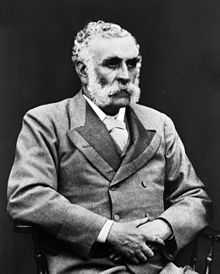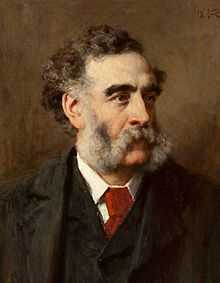Douglas Argyll Robertson


Douglas Moray Cooper Lamb Argyll Robertson FRSE (1837 – 3 January 1909) was a Scottish ophthalmologist and surgeon. Argyll Robertson pupil is named after him.[1]
Life
He was born in Edinburgh in 1837. He was son of Dr. John Argyll Robertson, surgeon and president of the Royal College of Surgeons of Edinburgh in 1846.[2]
After earning his medical degree in 1857 from the University of St Andrews, he went to Berlin to study under Albrecht von Graefe (1828–1870). Robertson spent most of his medical career in Edinburgh as an eye surgeon at the Edinburgh Royal Infirmary and teacher of ophthalmology at the University of Edinburgh. For a while he was honorary eye physician to Queen Victoria and King Edward VII.
Robertson made several contributions in the field of ophthalmology; in 1863 he researched the effects on the eye made by physostigmine, an extract from the Calabar bean (Physostigma venenosum), which is found in tropical Africa. He correctly predicted that physostigmine would become very important in the treatment of eye disorders. He also described a symptom of neurosyphilis that affects the pupils of the eye, which is known today as Argyll Robertson pupils.
References
- ↑ Waterston, Charles D; Macmillan Shearer, A (July 2006). Former Fellows of the Royal Society of Edinburgh 1783-2002: Biographical Index II. Edinburgh: The Royal Society of Edinburgh. ISBN 978-0-902198-84-5. Retrieved 22 March 2011.
- ↑
 This article incorporates text from a publication now in the public domain: Power, D'Arcy (1912). "Robertson, Douglas Moray Cooper Lamb Argyll". In Lee, Sidney. Dictionary of National Biography, 1912 supplement. London: Smith, Elder & Co.
This article incorporates text from a publication now in the public domain: Power, D'Arcy (1912). "Robertson, Douglas Moray Cooper Lamb Argyll". In Lee, Sidney. Dictionary of National Biography, 1912 supplement. London: Smith, Elder & Co.
Sources
| Wikimedia Commons has media related to Douglas Argyll Robertson. |
- "Argyll Robertson". Doyne's Hall of Fame. Retrieved 11 November 2007.
- Power, Sir D'Arcy. "Robertson, Douglas Moray Cooper Lamb Argyll (1837–1909)". Oxford Dictionary of National Biography (online ed.). Oxford University Press. doi:10.1093/ref:odnb/35778. (Subscription or UK public library membership required.)